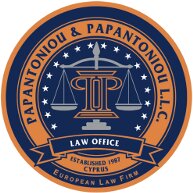Best Energy Regulatory Law Lawyers in Nicosia
Share your needs with us, get contacted by law firms.
Free. Takes 2 min.
List of the best lawyers in Nicosia, Cyprus
About Energy Regulatory Law in Nicosia, Cyprus
Energy Regulatory Law in Nicosia, Cyprus refers to the legal framework that governs the generation, distribution, supply, and use of energy resources within the city and across the country. The energy sector in Cyprus is experiencing significant transformation, especially with ongoing efforts to integrate renewable energy sources and to comply with European Union directives. Regulatory bodies and laws seek to ensure a stable, secure, and sustainable energy market that meets both environmental standards and consumer needs. The Energy Regulatory Authority, known as the Cyprus Energy Regulatory Authority (CERA), is primarily responsible for overseeing compliance and regulating market activities.
Why You May Need a Lawyer
There are several scenarios where seeking advice from a lawyer experienced in Energy Regulatory Law becomes crucial. Individuals, businesses, and investors may need legal assistance when applying for permits or licenses to operate in the energy sector, negotiating complex contracts, handling disputes with energy suppliers or consumers, or ensuring compliance with evolving environmental and safety standards. Legal expertise is also valuable in understanding regulatory changes, securing intellectual property rights for new technologies, and dealing with cross-border energy transactions, especially for those interested in renewable energy projects or electricity market participation in Nicosia, Cyprus.
Local Laws Overview
The legal environment for energy regulation in Nicosia is shaped by both Cypriot and European Union law. The key laws include the Electricity Market Law, the Natural Gas Market Law, and specific regulations concerning the promotion of renewable energy sources. CERA is responsible for granting licenses, monitoring compliance, approving tariffs, and implementing EU directives related to energy. Environmental and planning permissions are also crucial and require additional regulatory approvals, especially for infrastructure projects. Consumer protection rules and anti-monopoly regulations play an important role in ensuring transparency and fair competition in the local energy market.
Frequently Asked Questions
What is the main authority regulating energy in Nicosia, Cyprus?
The Cyprus Energy Regulatory Authority, or CERA, is the main public body responsible for overseeing energy regulation on the island, including Nicosia.
Do I need a license to generate renewable energy for personal or commercial use?
Yes, most commercial and some personal renewable energy installations require a license from CERA and compliance with specific technical and safety standards.
Is it possible for private individuals or businesses to sell excess electricity back to the grid?
Under certain net metering and net billing programs, individuals and businesses can sell or offset excess electricity generated by renewable sources, subject to regulatory approval and conditions set by CERA.
What are the main laws governing the energy market in Nicosia?
The main statutory framework consists of the Electricity Market Law, the Natural Gas Market Law, and various government decrees implementing EU directives regarding energy efficiency, renewables, and market liberalization.
How does Cyprus promote renewable energy?
Cyprus has introduced incentives, grants, and feed-in tariffs overseen by CERA to promote investment in renewable energy systems such as solar photovoltaic installations, wind, and biomass projects.
Are there any specific consumer protections for energy users?
Yes, consumer protection laws ensure transparent pricing, reliable supply, and fair resolution of disputes. The Cyprus Consumer Protection Service also provides additional support in energy matters.
What are the penalties for non-compliance with energy regulations?
Penalties may range from administrative fines and license suspension to criminal prosecution, depending on the severity and type of non-compliance.
Can foreign investors participate in the energy market in Cyprus?
Yes, the energy sector is open to foreign investment, subject to standard regulatory requirements and approval processes managed by CERA and other relevant authorities.
How are energy tariffs set in Cyprus?
Energy tariffs are regulated and approved by CERA to ensure prices reflect market conditions, investment needs, and consumer protection objectives.
Do energy projects require environmental approvals?
Yes, most energy projects, particularly those involving new infrastructure or renewable sources, require environmental impact assessments and planning permission before commencement.
Additional Resources
Several local and national organizations provide information and assistance about Energy Regulatory Law in Nicosia:
- The Cyprus Energy Regulatory Authority (CERA) - regulator for electricity and gas markets
- The Cyprus Transmission System Operator (TSO) - responsible for transmission network operations
- Department of Environment of the Ministry of Agriculture - for environmental regulations and impact assessments
- Cyprus Consumer Protection Service - for energy consumer rights and complaints
- Chamber of Commerce and Industry - guidance for businesses and investors in the energy sector
Next Steps
If you are facing an issue related to Energy Regulatory Law in Nicosia or plan to engage in energy project development, consider the following steps:
- Identify your specific legal issue or project needs
- Gather all relevant documentation, such as contracts, correspondence with regulators, and technical plans
- Consult a qualified lawyer specializing in Cypriot Energy Regulatory Law to obtain expert legal advice
- If necessary, contact the relevant local authorities (for example, CERA) for application forms, guidance, or regulations
- Stay updated on changes in the law, especially if your project will have long-term operation or investment implications
Seeking specialized legal support early in the process can help prevent costly delays, ensure compliance, and protect your interests in the evolving Cypriot energy market.
Lawzana helps you find the best lawyers and law firms in Nicosia through a curated and pre-screened list of qualified legal professionals. Our platform offers rankings and detailed profiles of attorneys and law firms, allowing you to compare based on practice areas, including Energy Regulatory Law, experience, and client feedback.
Each profile includes a description of the firm's areas of practice, client reviews, team members and partners, year of establishment, spoken languages, office locations, contact information, social media presence, and any published articles or resources. Most firms on our platform speak English and are experienced in both local and international legal matters.
Get a quote from top-rated law firms in Nicosia, Cyprus — quickly, securely, and without unnecessary hassle.
Disclaimer:
The information provided on this page is for general informational purposes only and does not constitute legal advice. While we strive to ensure the accuracy and relevance of the content, legal information may change over time, and interpretations of the law can vary. You should always consult with a qualified legal professional for advice specific to your situation.
We disclaim all liability for actions taken or not taken based on the content of this page. If you believe any information is incorrect or outdated, please contact us, and we will review and update it where appropriate.














